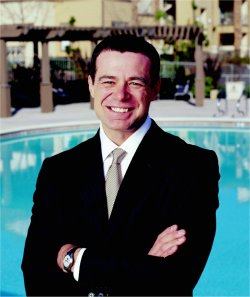Next Steps The next, and perhaps most difficult step is developing a company culture. UDR has begun that process with new associates, who receive a very rigid lesson on day one – here is what you need to know about UDR. Then the company sends them to leasing school. “Right now we are just training all of our leasing people. It’s a two-day school on how to lease, answer the phone, and treat people with common courtesy,” says Toomey. “But I think we are going to expand it to all of our maintenance associates, so they follow through on service requests.”
The purpose of the training is to create a culture and grow skills. “Right now, I’m just trying to get them to answer the phone in the right manner and greet you with a smile,” says Toomey. “People want to know how they can do better and if they don’t then we really don’t need them.
“Colleges have a culture because the upperclassmen show the underclassmen the ropes,” explains Toomey. “That is how you build a common set of values – learning by watching the upperclassman. We need to start building towards that. We have committed to a two-year effort to start building these types of programs. That’s what our company needs; to rise to be the best operator we can be.”
Fulfilling Operations To run a successful property management company, a multifamily company needs to achieve excellence in three components of operations – processes, asset preservation, and people, according to Thomas W. Toomey, president and CEO of United Dominion Realty Trust (UDR).
On the process side, UDR identifies processes that don’t touch the customer. It wants to standardize those. Take payroll as an example. Every associate’s check is automatically deposited into his or her account. “That is one effort to standardize processes and eliminate the cost of sending checks by Federal Express or reissuing lost checks,” says Toomey. “You can start saving money by standardizing things, which means people become more efficient and it frees up their time [to run the company and its communities better].”
When it comes to assets, achieving excellence is a matter of having the right property in the right market. With the economic uncertainties facing the multifamily industry, middle-market apartments have proven to be more predictable. And predictability is synonymous with safety.
UDR believes successful companies diversify their investments. “You can’t be in one market or one region because things can go bad,” explains Toomey. In addition, a successful multifamily company will have minimal development risk.
But at the end of the day, Toomey wants his people to understand that there are two equal but separate sides to running a multifamily business – sales and service. “You find that at small communities people who run the office are also doing the leasing and some of the maintenance,” explains Toomey. “Those are very different roles. Plus, our maintenance technicians don’t understand that they are the primary service providers. They think they are just out there fixing something.”
Once the staff understands their role, the next step is to keep them happy and committed to working at UDR. Because the multifamily industry is known for high turnover in associates, UDR is committed to offering an economic solution to get people to stay longer and commit to careers.
“I think if we accept 60 percent to 70 percent associate turnover it will be reflected in the quality of service,” explain Toomey. “It has to be reflected in the quality of sales, it has to be reflected in the cost it takes to run a company. I think [offering a retirement package and monetary incentives] would be a good start in making a difference.”
While Toomey recognizes the importance of having the right processes and the right assets, he realizes that all of those things can be replicated. As a result, he is spending more time and money investing on the people side of the business. “My view and approach is that, instead of trying to get the next best software or training program, maybe the best thing to do is to get the best people and keep them working for us,” says Toomey.
